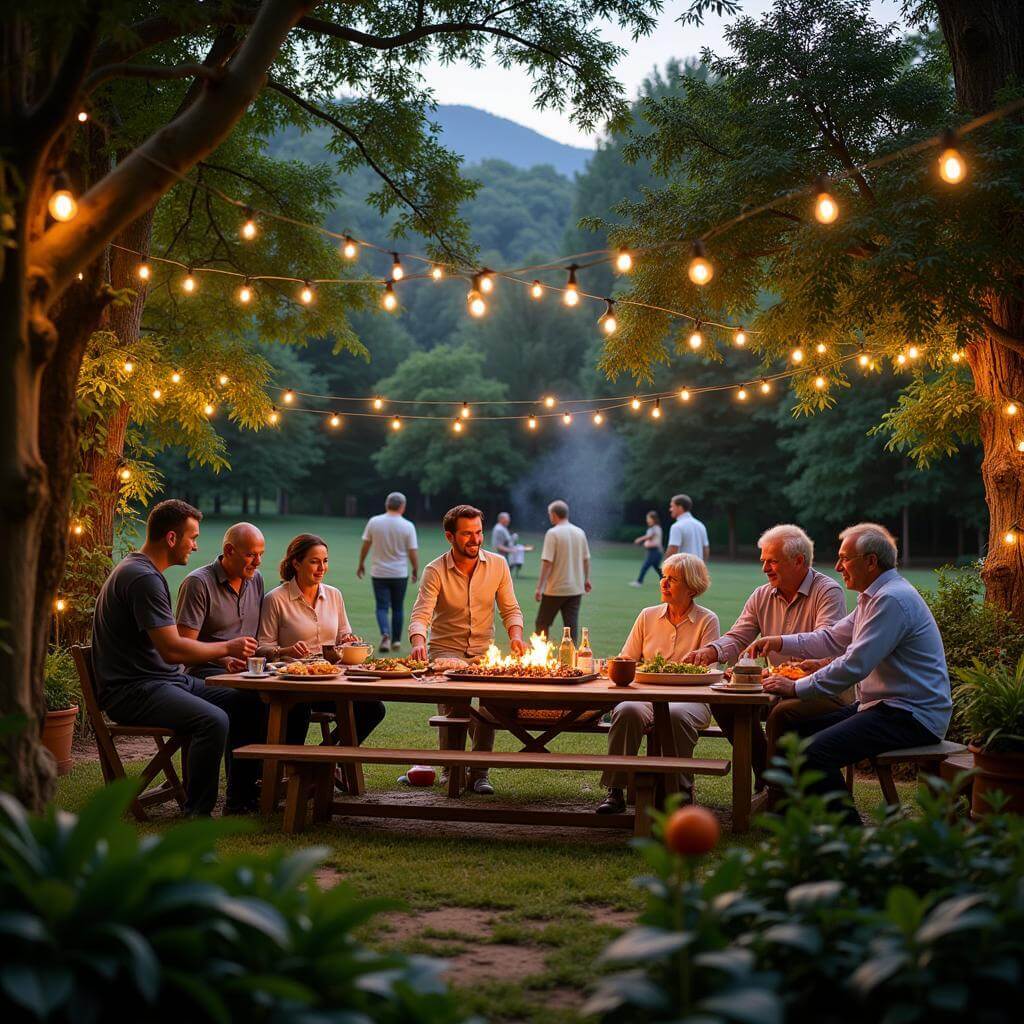Family gatherings are a common topic in IELTS Speaking tests, particularly when discussing personal experiences or cultural traditions. The question “Describe a family gathering you enjoyed” has appeared frequently in past exams and is likely to remain relevant in future tests. This topic allows examiners to assess your ability to narrate events, express emotions, and discuss family relationships in English.
Describe a traditional dish in your country is another popular IELTS Speaking topic that often ties in with family gatherings, as special meals are often a central part of these events.
Part 1: Introduction and Interview
In Part 1, the examiner may ask general questions about family gatherings. Here are some common questions and a sample answer:
Examiner: Do you often have family gatherings?
Candidate (Band 8-9 answer): Absolutely, we make it a point to get together quite frequently. In fact, we have a standing tradition of monthly family dinners where everyone brings a dish to share. It’s a wonderful way to stay connected and catch up on each other’s lives, especially given our hectic schedules these days.
Part 2: Long Turn (Cue Card)
Here’s a sample cue card for this topic:
Describe a family gathering you enjoyed
You should say:
- When and where it took place
- Who was there
- What you did during the gathering
- And explain why you enjoyed it
Sample answer (Band 8-9):
I’d like to talk about a memorable family reunion that took place last summer at my grandparents’ countryside home. It was a joyous occasion that brought together relatives from far and wide, some of whom I hadn’t seen in years.
The gathering was held to celebrate my grandparents’ 50th wedding anniversary, and it was truly a sight to behold. The sprawling garden was adorned with fairy lights and festive decorations, creating a magical atmosphere that set the perfect tone for the event.
Nearly every member of our extended family was in attendance, from distant cousins to great-aunts and uncles. It was heartwarming to see multiple generations coming together, with the youngest toddlers playing alongside their great-grandparents.
Throughout the day, we engaged in a variety of activities that catered to all ages. We had a friendly cricket match in the afternoon, followed by a sumptuous barbecue featuring family recipes passed down through generations. As the evening approached, we gathered around a bonfire to share stories and reminisce about family history.
What made this gathering particularly enjoyable was the sense of unity and love that permeated the air. It was more than just a celebration; it was a reaffirmation of our family bonds. Watching my grandparents, still so in love after 50 years, surrounded by the family they had nurtured, was deeply moving.
The event also provided a rare opportunity to reconnect with relatives I seldom see due to geographical distance. Catching up on their lives and sharing our experiences was both fascinating and enlightening.
In essence, this family gathering was a perfect blend of nostalgia, joy, and togetherness. It reminded me of the importance of family and left me with memories I’ll cherish for a lifetime.
 Family gathering outdoor celebration in countryside
Family gathering outdoor celebration in countryside
Examiner: Thank you. Now, I’d like to ask you a few more questions related to this topic.
- How important are family gatherings in your culture?
- Do you think family gatherings are becoming less common nowadays? Why or why not?
Sample answers:
How important are family gatherings in your culture? (Band 8-9)
In my culture, family gatherings are considered paramount. They’re not just social events, but rather a cornerstone of our cultural identity. These gatherings serve multiple purposes: they help maintain family ties, pass down traditions, and provide a support network. They’re seen as vital for preserving our cultural heritage and instilling a sense of belonging in younger generations. Moreover, they often coincide with important festivals or life events, making them integral to our cultural and social fabric.
Do you think family gatherings are becoming less common nowadays? Why or why not? (Band 8-9)
It’s a complex issue, but I believe there’s been a shift in the nature of family gatherings rather than a decline. While traditional, large-scale gatherings might be less frequent due to factors like urbanization and busy lifestyles, we’re seeing new forms of family connections emerge. For instance, technology has enabled virtual gatherings, allowing families to connect across vast distances. Additionally, there’s a growing trend of smaller, more frequent meet-ups rather than grand annual events. So, while the form may be evolving, the essence of family togetherness remains strong. It’s about adapting to changing circumstances while maintaining those crucial family bonds.
Part 3: Two-way Discussion
Examiner: Let’s discuss family gatherings in more detail. How do you think family gatherings differ between urban and rural areas?
Candidate (Band 8-9): There are several notable distinctions between family gatherings in urban and rural settings. In rural areas, gatherings tend to be more traditional and expansive, often involving extended family members and even the wider community. These events are typically centered around agricultural seasons or long-standing local customs.
In contrast, urban family gatherings are often more compact and frequent, adapting to the fast-paced city lifestyle. They might revolve around weekend brunches or quick dinner meet-ups rather than day-long affairs. Urban gatherings also tend to be more diverse in terms of activities, perhaps incorporating modern entertainment or dining out at restaurants.
However, it’s important to note that these are generalizations, and individual family cultures can vary greatly. The core values of bonding and togetherness remain consistent, regardless of the setting.
Describe a traditional dish you enjoy is another topic that can be linked to family gatherings, as traditional foods often play a significant role in these events.
Examiner: In what ways do you think family gatherings contribute to maintaining cultural traditions?
Candidate (Band 8-9): Family gatherings play a crucial role in preserving and transmitting cultural traditions. They serve as a living conduit for intergenerational knowledge transfer. During these events, older family members often share stories, customs, and historical anecdotes with younger generations, ensuring the continuity of cultural heritage.
Moreover, many traditions are inherently tied to family gatherings. For instance, the preparation of traditional dishes, the observance of specific rituals, or the wearing of traditional attire during these events all contribute to keeping cultural practices alive. These gatherings also provide a platform for practicing language, especially in families where the heritage language might be at risk of being lost.
Additionally, family gatherings often coincide with cultural or religious festivals, further reinforcing the connection between family, culture, and tradition. This synergy creates a powerful mechanism for cultural preservation and identity formation, especially in multicultural societies where maintaining one’s cultural roots can be challenging.
Key Vocabulary and Phrases for High Scores
-
Joyous occasion [ˈdʒɔɪəs əˈkeɪʒən] (noun phrase): A very happy event or time.
Example: The wedding was a joyous occasion filled with laughter and love. -
To adorn [əˈdɔːn] (verb): To decorate or add beauty to something.
Example: The room was adorned with flowers and candles for the celebration. -
Sumptuous [ˈsʌm(p)tʃuəs] (adjective): Luxurious or extravagant, especially in relation to food.
Example: We enjoyed a sumptuous feast at the family gathering. -
To reminisce [ˌremɪˈnɪs] (verb): To indulge in enjoyable recollection of past events.
Example: The elderly relatives spent the evening reminiscing about their childhood. -
Cornerstone [ˈkɔːnəstəʊn] (noun): A fundamental or essential part.
Example: Family gatherings are a cornerstone of our cultural traditions.
Describe a family celebration you enjoyed recently is another related topic that often appears in IELTS Speaking tests, allowing candidates to showcase their language skills in describing events and emotions.
Examiner’s Advice
To achieve a high score in the IELTS Speaking test when describing a family gathering:
- Use a wide range of vocabulary, including idiomatic expressions and phrasal verbs.
- Demonstrate your ability to use complex grammatical structures accurately.
- Speak fluently with minimal hesitation, but use pauses naturally for emphasis.
- Provide detailed responses that fully address the question and include personal experiences.
- Show enthusiasm in your tone and manner when discussing positive experiences.
- Practice describing events and emotions in English regularly to improve your spontaneity.
Remember, the key to success is not just in memorizing answers, but in developing the ability to communicate effectively and naturally in English. Regular practice and exposure to the language will help you achieve this goal.
 IELTS Speaking test preparation
IELTS Speaking test preparation
Describe a holiday you look forward to each year is another topic that can be connected to family gatherings, as many holidays involve family reunions and celebrations.


